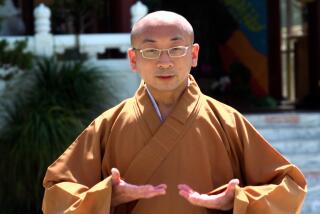Festival Offers Insight Into Roots of Buddhism
- Share via
There is an ancient Buddhist tale about a monk, Mogallana, who learned how to contact his deceased mother and found that she wasn’t very happy in the afterlife.
Mogallana went to Buddha for advice and was told that acts of charity and kindness would release his mother from her sorry state.
The monk’s subsequent compassionate works had the desired effect and his grief turned into a dance of joy which, in Japan, became a form of folk dancing called Bon Odori.
The dances are traditionally performed during the Japanese festival called Obon, which the West Covina Buddhist Temple will celebrate Saturday.
“I think the Japanese place more importance on that story, yet it is through the whole canon (of Buddhism, globally),” said Nori Ito, who is the ordained person, or priest, at the temple.
He explained that Buddhism started in India about 2,500 years ago and that there are different denominations, as there are in Christianity.
“Although the basic teachings are the same, all the teachings and the practice and the interpretation can be quite different,” he said.
For example, Thai Buddhist priests are not allowed to touch women, and there is a stronger monastic tradition with Zen Buddhists.
Ito’s congregation is Shin Buddhism and even though its priests are not allowed to touch women, they can marry.
In addition to Bon Odori dancing, there will be Taiko drumming demonstrations, ikebana flower arrangements, bonsai, Japanese embroidery and classical Japanese dance.
And there will be plenty of Japanese food.
The festival will be at the East San Gabriel Valley Japanese Community Center, 1203 W. Puente Ave., West Covina, from 1 to 10 p.m., with Taiko drumming at 6 p.m. and the Bon Odori at 7 p.m.
Admission is free.
More to Read
Sign up for Essential California
The most important California stories and recommendations in your inbox every morning.
You may occasionally receive promotional content from the Los Angeles Times.













